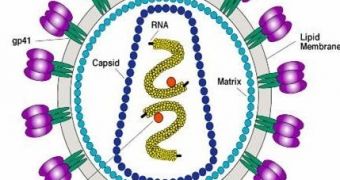Well, vagina appeared to be a better candidate for producing "microbicides", drug-delivery systems such as gels, rings, sponges or creams to prevent infection with HIV and other sexually transmitted diseases.
In 2006, University of Utah researchers have developed a vaginal "molecular condom" that starts as a liquid substance to be inserted by a woman vaginally, and which turns into a gel at body temperature and at the vaginal acidity of 4.2, and then in the presence of sperm with an acidity of 7.7, it becomes a liquid again, only to release an antiviral drug load to block infection with HIV.
This was four years away from testing on humans and roughly 9 years until it might be in widespread use and would be based on a polymer (a molecule with a repeating, chain-like structure) made from three chemicals in these proportions: 80 molecules of N-isopropylacrylamide, 15 molecules of butyl methacrylate and 5 parts acrylic acid (used in lubricant and spermicidal gels).
Another gel was based on the Dictyota pfaffi algae, aimed to protect women against sexual transmission of HIV and would be available also in 4 years.
But experiments made on women in South Africa, Benin, Uganda and India with two types of intravaginal gels revealed that the gels apparently made the women more vulnerable to the HIV, not less vulnerable as it was intended.
In the end, the penis seems to be the key. An Australian team has recently developed a penis lubricant that could stop the spreading of both HIV and genital herpes. Animal tests revealed that the new microbicide gel, called Viva Gel, inactivates the HIV virus and a genital herpes inducing virus strain.
"The gel would be used by heterosexual men who apply it directly to themselves before sex," said lead researcher Dr Jeremy Paull from Melbourne-based pharmaceutical company Starpharma.
This could be extremely useful in sub-Saharan African countries where the HIV epidemic is spread mostly through heterosexual sex. "The active ingredient in the microbicide is dendrimer, a molecule which binds itself to the viruses and prevents them from infecting healthy cells," said Paull.
Trials on animals revealed an 85 to 100 % effectiveness of this gel in blocking both viruses. Human trials are now underway. Preliminary results reveal it is safe and well tolerated by healthy men, circumcised or not. "The gel's ability to prevent genital herpes was particularly positive. The prevention of herpes indication, given the level of the epidemic in the developed world, perhaps gives us a different angle," said Paull.
"I believe it may be unique in terms of development for two different indications, both genital herpes and HIV," said Dr. Roberta Black from the US National Institute of Allergy and Infectious Diseases.
The gel is currently being tested on women, too, as a contraceptive method.

 14 DAY TRIAL //
14 DAY TRIAL //